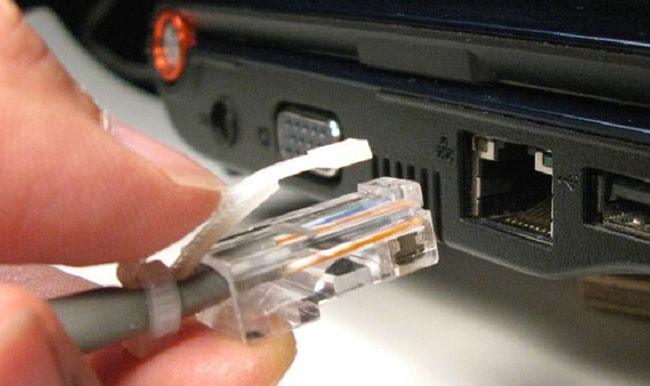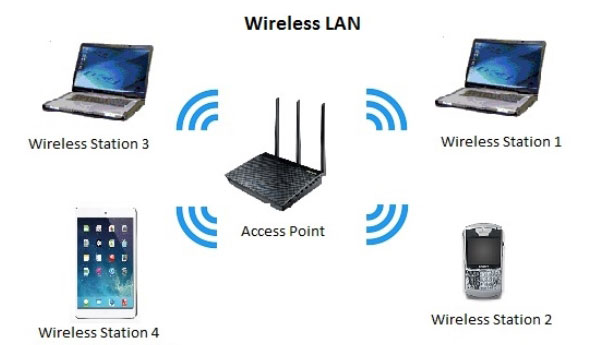Should choose wired LAN or wireless LAN?
Wired LAN
In the past, all workstations, printers, network adapters, and other devices were all connected by Ethernet cables. Today, this cable assembly is optional. But there are still a number of reasons you might want to make your device connect using a cable.
 There are still a few reasons you might want to make your device connected by cables
There are still a few reasons you might want to make your device connected by cables - Security : Generally, wired LAN is more secure than wireless. In a wired LAN, network security ends at every device and it's all located in the building. But when you connect wirelessly, you extend the system beyond the confines of a building and perhaps beyond your control.
- Speed : Ethernet is faster than WiFi. However, WiFi has also been faster in recent years. Usually Internet connection will be the real limiting factor for speed. If you can transfer large amounts of data directly from one computer to another on the same network - without using the Internet - you will notice that wired connections are faster.
- Stability : Wired connection is more stable than wireless, especially when you require a constant data stream.
- Latency : Also known as ping, latency is the time it takes a packet of information to move between computers. Wired networks beat wireless at this point. This can be important if your business has to edit videos or download and upload large files, but the difference in latency is negligible.
- Less noise : Wired LANs do not experience the interference that wireless networks experience. Neighbors' networks, objects between you and your router or competing devices pose no problems to wired LAN users.
Wireless LAN
It seems that wired LANs are still beating WiFi in the business. Very few businesses only use WiFi. However, wireless LAN has the strength and the application has developed in recent years since the creation of the 802.11ac standard.
 Wireless LAN has its own strengths
Wireless LAN has its own strengths - Convenience : When many offices tend to switch to hot desking - employees without fixed desks - wireless is obviously necessary. Otherwise, employees will have to spend half a day unplugging and plugging the cables.
- Tidy and tidy : No tangle of cables. They are very difficult to clean and cause dust to get around.
- Cost : For a business that constantly replenishes employees or spreads across a large office, wireless networks can be cost-effective. The wireless LAN signal strength has been improved. With some reasonable access points, businesses can avoid using cables.
- BYOD (Bring Your Own Device) Compliance : Many companies encourage employees to bring their own devices. And for private devices, once again, wireless networks dominate. Fortunately, iPhones and smartphones don't come with Ethernet ports.
Situations using wireless or wired LAN
Some cases have been mentioned, but the article will highlight a few common situations when deploying wireless LAN or wired LAN.
 Should choose wired LAN or wireless LAN?
Should choose wired LAN or wireless LAN? Education
The education industry has rapidly adopted both wired and wireless LAN connections for students, faculty and staff. Most universities over the past decade have supported wireless Internet. Although students in elementary, middle, and high school classes continue to use wired devices in the classroom, the adoption of wireless LAN has expanded significantly.
Businesses with young labor force
When the workforce falls under the age of 30, it's likely that businesses have a corporate structure that supports collaborative office environments. Everyone has the freedom to sit anywhere, use any device and this requires a wireless connection.
Retail business
Wireless LAN serves dual purposes for retail businesses: Internet access for employees and a private network for customers. Customers require a wireless connection and this may be a factor affecting the retailer's Internet access.
Enterprises with "flat" management hierarchy
Businesses with a "flat" management hierarchy are essentially cooperative and often do not have strict rules about the equipment and location of employees. A business management structure follows a hierarchical organizational chart, which tends to contain cubicles (the cabin works individually for each employee) and these cubicles require a wired Internet connection.
Businesses with no security risks or nearby neighbors
When there is no need for strict cybersecurity precautions or nearby neighbors, wireless LAN becomes an attractive option. However, for example, if your office is located on the top floor of an 8-storey building, there may be a lot of competing networks, leading to both security and productivity issues.
Businesses with an IT support team
Whether your business has an internal IT department or works with external support, the number one issue for IT departments on a wireless LAN is connectivity. Get ready for a series of questions related to your network when you need assistance.